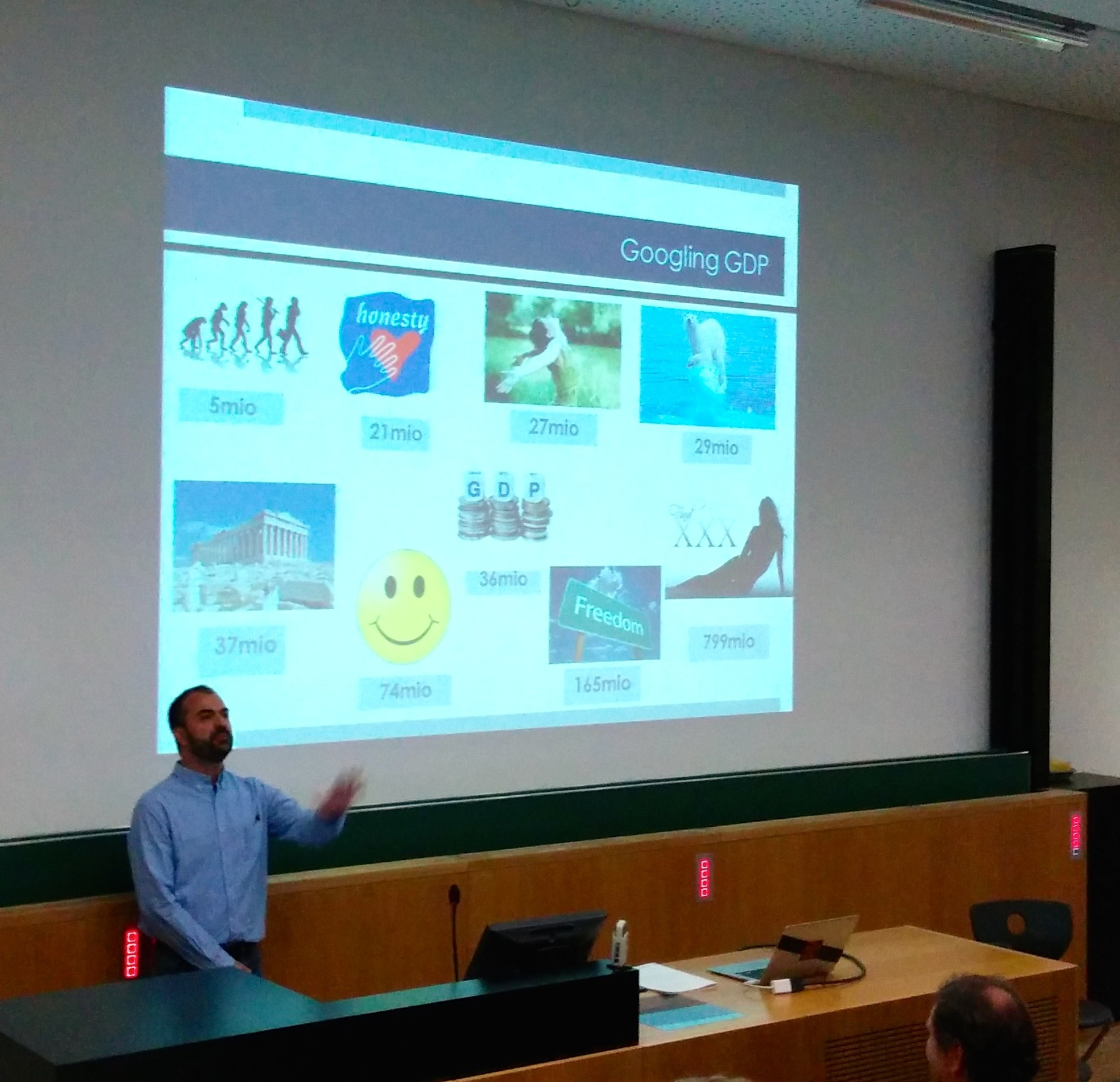In October 2020, I analysed press coverage of degrowth in Western European (English language) newspapers and magazines between January 2015 and October 2020. Using media theory concepts such as agenda setting and framing, my research explored how degrowth is being considered in the press, particularly as a potential response to climate change.
Are you a fanatic, a fetishist or a member of a cult? If you are a supporter of degrowth, then you are likely to be portrayed that way in the press. My research found that degrowth is not yet on the media agenda, except in a very limited and mostly dismissive way. The English-language press is not informing the public thoughtfully of alternatives to our current political-economic system or the impact of unfettered growth on the planet.
Greta Thunberg gave a stirring speech to the United Nations in 2019, challenging the leaders of the world to think differently about their approach to climate change. In her direct style, she delivered a stinging rebuke of governments’ emphasis on continuous economic growth, telling the gathering: “We are in the beginning of a mass extinction, and all you can talk about is money and fairy tales of eternal economic growth.”
Thunberg echoes the degrowth movement – an increasing body of academics and activists, who argue that economic growth cannot be decoupled from increased greenhouse gas emissions. Instead, they advocate for degrowth as a potential solution to climate change. An open letter proposing putting degrowth principles at the root of a new economy attracted over 2,000 signatories and has been translated into 18 languages. Academic interest in degrowth appears to have increased significantly in recent years.
In my research, I considered whether the added context of the Covid-19 pandemic, which in Arundhati Roy’s words brought “the engine of capitalism to a juddering halt”, has provided a catalyst for consideration of how growth might be redefined post-Covid and possibly even “post capitalism”? Or, as David Harvey has long suggested, has the “conceptual apparatus” of growth become so “embedded in common sense as to be taken for granted and not open to question”?
Media studies research suggests that what the media covers and not just how it is covered, has an effect on the importance of issues to the audience. An initial search for ‘degrowth’ returned 1,035 press and magazine articles, but these were overwhelmingly concerned with concerns about economic growth, with ‘degrowth’ as a term being primarily used to describe economic/business decline. As my primary focus was on climate change, I narrowed the search parameters to include ‘climate’, resulting in a sample of 65 articles. I found that degrowth is referenced in less than 5% of articles on climate change during the period studied.
Although frequency of coverage did increase in 2019, this was not sustained in 2020. The pandemic may have contributed to crowding out all other topics, but it has also led to some examination of future economic direction. Articles on degrowth in 2020 tend to be in the context of post-Covid economic recovery.
Further, although the 65 articles I analysed in detail appeared in 22 different newspapers and magazines, less than half (28) appeared in publications with a circulation of more than 100,000. Not surprisingly, the Guardian, which has positioned itself as taking a lead on covering climate change, carried the most coverage, with 13 articles. In no instance was degrowth covered as part of a front page or prominent news article.
These findings suggest that degrowth has not yet garnered sufficient media attention to build broad public awareness and knowledge.
Building on the ground-breaking work of anthropologist Erving Goffman, framing studies look at how messages are presented to audiences. Frames are defined by Nisbet as a way of organising central ideas on an issue. They are intrinsic to story-telling, and are used by journalists to simplify complex concepts and by audiences to understand them. A frame “provides meaning… suggesting what the controversy is about and the essence of an issue”. My research used Nisbet’s typology of frames to analyse coverage of degrowth.
When degrowth is discussed in the press, Economic Development is by far the most frequently occurring frame. Within this frame, there are polarised views, which can be summed up as ‘growth is progress’, versus ‘we can have prosperity without growth’ (to borrow Tim Jackson’s phrase).
Proponents of degrowth such as Jason Hickel in The Guardian, use the frame of ‘prosperity without growth’ to argue that social progress and wellbeing are not dependent on economic growth. Hickel and others contest the notion that “to abandon growth would be to abandon human progress itself” and show that greater prosperity might be achieved for more people if the economy is shifted away from a constant focus on capital accumulation.
The alternative and more frequent framing in the press is that human progress has come directly from economic growth, and that continued growth is a prerequisite for continued progress:
“Free market magic has pulled billions of people out of poverty in recent decades. If anything, we need growth more than ever to enable us to innovate our way out of environmental degradation” (City A.M., 2019).
In most cases, degrowth is dismissed out of hand with few articles giving it thoughtful consideration. The notable exceptions in the sample are in The Guardian, reflecting its editorial commitment to highlighting climate change, and one article in Le Monde Diplomatique.
Where degrowth is being dismissed, the choice of language underpins the ‘growth is progress’ frame by depicting degrowth proponents as being outside the mainstream. The use of words such as fanatic, fetishist, dogmatist, and missionary is reminiscent of “climate dismissives” who “deride those advocating climate action as overly earnest and sanctimonious”. Those arguing for degrowth are portrayed as quasi-religious zealots, inferring that the ideas they are proposing do not demand serious consideration:
“Their activism is taking on cultlike status. One of the most pernicious ideas advocated by climate activists is ‘degrowth’” (City A.M.).
Where Social Progress was the dominant frame, the articles focused more on broader society and culture than on the economic aspects. The frame of the ‘good life’ or ‘buen vivir’ was used by proponents of degrowth to demonstrate how it could lead to “a positive future, a truer form of progress”. Alternatively, in articles where economic growth was portrayed as positive, degrowth was framed as impeding social progress or anti-modernist.
In articles that used Conflict & Strategy, the framing was largely political, describing a conflict between competing views. Climate protests featured as well as disagreements over aspirations for economic growth and prosperity on the one hand, and “radical” ideas of degrowth that were portrayed as imposing limits on political and economic ambitions.
The findings of this study indicate that degrowth has largely been ignored or disdained in the press to date. It appears that the paradigm of economic growth is so deeply embedded that any challenges to it are often summarily dismissed or attacked. Instead, the discourse of sustainable development is dominant with its dubious promise that it is possible “simultaneously to grow the economy and to protect the environment”.
There is some evidence that the pandemic has challenged some of the deeply held notions about growth, but the resulting recession has reinforced beliefs in the press that countries need to return to economic growth. Because ‘degrowth’ is a concept that may not fit easily within mainstream assumptions, it has not received much attention and for the most part, has not been seriously considered.
As we move out of the pandemic, and before a ‘new normal’ is established, there may be a window to question some deeply held assumptions. Leading degrowth scholars have been doing just that as they reflect on learnings for degrowth from Covid-19, including on this website. In the words of the late David Graeber, it is critical that we do not let that window close this time.
*This piece was originally published on 4 June 2021.

In a recent article for Forbes, Corbin K Barthold makes several allegations against the idea of degrowth without having a clear understanding of the concept. He also includes some quotations - originally reported in a different article (by Aaron Timms) - from a vibrant classroom discussion which took place at the 2019 Degrowth Summer School hosted by the Institute of Environmental Scienc...

Middle-Europe's prosperity as well as our high levels of mobility and consumption are based on three industrial revolutions whose technical progress has constantly been increasing labour productivity. The consequences are paradoxical: On one hand it is possible to produce ever more goods with the same amount of work. On the other hand these productivity increases are being used to make human la...

By Chris Ward Growth is always a goal in many countries, statistics appear everywhere and it’s always discussed. Even small reductions in GDP are met with bitter disappointment; it’s become one of the most important measures in the modern era. And yet there are surprisingly few discussions or resources on when and why this did happen. The special session on degrowth and history sheds some ligh...